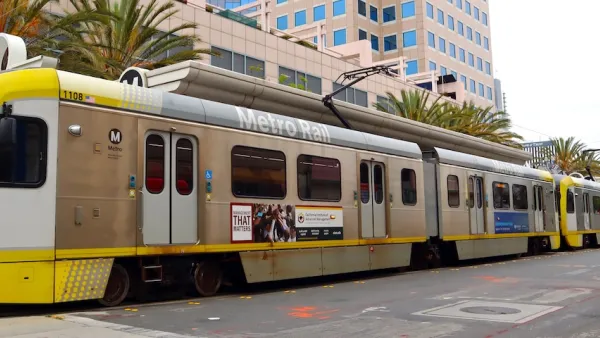Light rail vehicles aren't as green one might think, and cities that really want to lower carbon emissions might want to take a harder look at new hybrid-electric buses, argues a recent column.
"Light rail in practice uses about as much energy to move a passenger a mile as does your average car, reports transit expert Randal O'Toole of the Cato Institute, the libertarian think tank. When it comes to carbon dioxide per passenger mile, light rail beats the average car only in some cities -- mainly where electricity doesn't come from coal or oil. Nearly everywhere, you put out less carbon by driving a Prius than by taking the train.
This isn't what most people expect. Still, O'Toole, a longtime critic of light rail, confined himself to data from federal transit and energy agencies. When I checked with head researcher Steven Polzin at the transit-friendly National Center for Transit Research, he said the numbers were good and the conclusion true. Most people assume rail is far more efficient, "but the empirical data isn't very compelling," he said."
"If you fill the trains, per-passenger energy use is lower, but, says Polzin, the average load per railcar has fallen in the long run as rail expands to more marginal markets. The share of commuters taking public transportation has fallen in 20 of 25 cities since the installation of light rail or, for older systems, since 1970, say federal figures. Most of those lured by trains came off buses, not out of cars.
The upshot, says O'Toole, is that while light rail puts out about 0.36 pounds of carbon dioxide per passenger mile - and more than a pound a mile in Baltimore, Pittsburgh or Cleveland - a hybrid Prius puts out 0.26."
"Minneapolis actually did lower carbon emissions with its light rail line, saving 16 million pounds of carbon dioxide when passengers switched from buses. It's also saving millions more by replacing old buses with hybrid-electrics. But while light rail cut carbon at a cost of $2.20 a pound, says O'Toole, buses did it for 60 cents."
FULL STORY: Another green tale is derailed

Planetizen Federal Action Tracker
A weekly monitor of how Trump’s orders and actions are impacting planners and planning in America.

Maui's Vacation Rental Debate Turns Ugly
Verbal attacks, misinformation campaigns and fistfights plague a high-stakes debate to convert thousands of vacation rentals into long-term housing.

Restaurant Patios Were a Pandemic Win — Why Were They so Hard to Keep?
Social distancing requirements and changes in travel patterns prompted cities to pilot new uses for street and sidewalk space. Then it got complicated.

In California Battle of Housing vs. Environment, Housing Just Won
A new state law significantly limits the power of CEQA, an environmental review law that served as a powerful tool for blocking new development.

Boulder Eliminates Parking Minimums Citywide
Officials estimate the cost of building a single underground parking space at up to $100,000.

Orange County, Florida Adopts Largest US “Sprawl Repair” Code
The ‘Orange Code’ seeks to rectify decades of sprawl-inducing, car-oriented development.
Urban Design for Planners 1: Software Tools
This six-course series explores essential urban design concepts using open source software and equips planners with the tools they need to participate fully in the urban design process.
Planning for Universal Design
Learn the tools for implementing Universal Design in planning regulations.
Heyer Gruel & Associates PA
JM Goldson LLC
Custer County Colorado
City of Camden Redevelopment Agency
City of Astoria
Transportation Research & Education Center (TREC) at Portland State University
Jefferson Parish Government
Camden Redevelopment Agency
City of Claremont





























